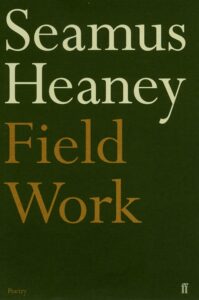In contrast to the choice he made for North, Seamus Heaney left the poems in Field Work as a continuous furrow, not divided into parts. Sections still emerge naturally from his arrangement of the poems. The ten “Glenmore Sonnets” give the collection a firm spine running straight up and down the middle of this body of work. Death begins the book, though both elegies and portraits fill its first third. After the sonnets, Heaney turns to the seasons and the natural world before finishing nearly as he began with an elegy and a tale from Dante’s Inferno.
Field Work was published in 1979, and although Heaney had been living in the Republic of Ireland for the four years since North was published, the sectarian killings in Northern Island were not far from his pen. Heaney life changed again in those years, too. In the first years of living in the Republic, Heaney and his wife and three children had been living out in the countryside, sustained by the varied incomes of a freelance writer. In 1975, he took another teaching job. “What I’d been after was a separate domain for myself as a poet, a surer sense of a destiny. And the three years in ‘the hedge school’ had given me that. Still, I did feel I was betraying something when we shifted ground to the suburbs; I’d reneged on something I loved, but it was for the sake of other loves. I also felt I was setting up good foundations for the next decade, marking a space within which and out of which I could operate as a poet.” (Stepping Stones, p. 227) The relocation is not apparent to me in the work, though.
The Troubles hit hard in poems such as “The Toome Road” or “Casualty.” The former begins:
One morning early I met armoured cars
In convoy, warbling along on powerful tyres,
All camouflaged with broken alder branches,
And headphoned soldiers standing up in turrets.
How long were they approaching down my roads
As if they owned them?
Though that question is of course the heart of the matter. Whose roads are they? Who speaks this “my,” who is included in its implied “we,” and who are “they”?
The latter is a tribute to an incorrigible and yet worthy drunk of the speaker’s acquaintance.
He would drink by himself
And raise a weathered thumb
Towards the high shelf,
Calling another rum
And blackcurrant, without
Having to raise his voice. …
A dole-kept breadwinner
But a natural for work
I loved his whole manner,
Sure-footed but too sly,
His deadpan sidling tact,
His fisherman’s quick eye
And turned observant back.
His drinking does him in, not by the usual paths that alcoholism takes, but more suddenly in the way of a land in the throes of civil fighting.
He was blown to bits
Out drinking in a curfew
Others obeyed, three nights
After they shot dead
The thirteen men in Derry.
For the rest of the poem, Heaney shifts between the man’s funeral and the fateful night he went out for one last drink, the virtues of good company and the man-made danger that lurked during those years.
He had gone miles away
For he drank like a fish
Nightly, naturally
Swimming towards the lure
Of warm lit-up places
The blurred mesh and murmur
Drifting among glasses
In the gregarious smoke.
How culpable was he
That last night when he broke
Our tribe’s complicity?
“A Postcard from North Antrim” carries the subtitle “In Memory of Sean Armstrong.” He was an acquaintance from the time in the early 1960s when they were both at Queen’s. In Stepping Stones, Heaney says that Armstrong “turned into a wonderful, colourful, original man, half hippy, half artist, wholly committed to trying to do some good in Belfast. He became active as a social worker, and was moving between the factions, crossing the peace line from Shankill to Falls; for that reason, we have to presume, he was regarded by the hard men as some kind of spy and was shot.” (pp. 222–23) The poem that precedes “Postcard” is “The Strand at Lough Beg.” Its dedication is to Colum McCartney, a cousin of Heaney’s. The details of his murder were never established — so of course no one ever stood trial for the deed — but Heaney says, “The consensus is that he was flagged down by a group of Loyalist paramilitaries rigged out in Ulster Defence Regiment uniforms.” (Stepping Stones, p. 222)
A non-violent death provides the occasion of Heaney’s “Elegy,” for Robert Lowell, which captures some of the other poet’s voice in a lovely tribute to a mentor.
The way we are living,
timorous or bold,
will have been our life.
Robert Lowell,
the still geranium is lit
by the lamp I write by
a wind from the Irish Sea
is shaking it —
here where we all sat
ten days ago, with you,
the master elegist
and welder of English.
“Welder” is written, but “wielder” is not far off, and certainly true to the subject. Ending the stanza but beginning the next sentence with Lowell’s name is a lovely way to pull the reader onward while emphasizing Heaney’s subject and his separateness. A later stanza puns on “craft” as both a metaphor for Lowell, whom Heaney calls “our night ferry/thudding in a big sea,” and on the craft of writing:
the whole craft ringing
with an armourer’s music
the course set wilfully across
the ungovernable and dangerous.
In a short “Song” toward the end of the collection, Heaney reaches for “that moment when the bird sings very close/to the music of what happens.” In Field Work, he comes very close himself.


1 ping
[…] of a Naturalist (1966) Door into the Dark (1969) Wintering Out (1972) North (1975) Field Work (1979) Station Island (1984) The Haw Lantern (1987) Seeing Things (1991) The Spirit Level (1996) […]